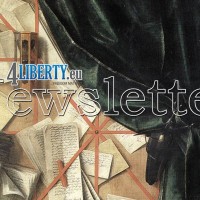
This year INESS organized yet the 5th Annual Economic Seminar with the participation of important domestic and foreign lecturers.
On 25 to 27 April nearly 30 students gathered in the mansion Mojmirovce near Nitra, interested not only in Austrian economics, but also in understanding the causes and consequences of a number of recent events that have an impact on society and spark public debate. The seminar, which annually attracts students from various universities and parts of Slovakia, was full of interesting topics, providing a plenty of possibilities to choose from for everyone. Seven domestic and two foreign speakers, together with students, were searching for answers to the central question of the seminar – state interventions or free markets?
The three-day intellectual adventure started with an introductory lecture by Dr. Matus Petrik, who presented the history and the main features and principles of the Austrian School of Economics. The consecutive lecture was delivered by Prof. Josef Sima, President of CEVRO Institut University in Prague, who sparked a debate about the pros and cons of the phenomenon of deflation, which is wrongly considered as a problem in the current social debates. The issue of (in)exhaustibility of natural resources was not left intact thanks to Martin Vlachynsky from INESS, nor was the issue of managing public finances, which was deeply studied by another INESS speaker, Radovan Durana, who in his lecture explained the main proportions of public finances and also focused on demystifying many stereotypes wrought in public mind. The first day of lectures was finished by Prof. Jan Sebo from The Matej Bel University in Banska Bystrica, who along with his students explained the current preparations of the amendment of annuity law (pension scheme), which have been strongly resonating in the media over the past few months and will have a major impact on the access to pension savings.
Prof. Josef Sima started the second day of lectures taking a closer look at the relationship between economics and law. He explained how and why these areas are closely interdisciplinary linked. The lecture was followed by the main speaker of the whole event, prof. Lawrence H. White from George Mason University in the U.S., who arrived to Slovakia upon the invitation of INESS and in his lecture entitled “The Clash of Economic Ideas” (professor’s recently published book in the U.S. bears the same title) he focused on the post-war period. He presented two post-war case studies (Germany and India), where he explained the different approaches to economic policy (market vs. centrally planned) and presented not only the implications of these policies, but also revealed various interesting facts from behind the scenes of their adoption. The Seminar was not missing a copyrights and patents topic either. Dr. Richard Durana of INESS in his lecture stated the reasons why it is necessary to revise the current concept of intellectual property rights. He showed on many historical examples why patents and copyrights are not conducive to meet the stated objectives – creativity and innovation. Thanks to the following speaker, Juraj Bednar from Digmia company, the students were able to take a deeper look into the nature and functioning of Bitcoin and other cryptocurrencies as an alternative or supplement to the current set-up of the financial system. The second day of lectures was, once again, concluded by Prof. Josef Sima with his reflection on the question of provision of defense and justice as a service on the market.
The last lecture day was marked by monetary policy. Juraj Karpis from INESS explained why the current state monopoly money with forced circulation is not an optimum alternative for the economy and what its costs are. This topic is also discussed in his forthcoming book Bad Money, which will be released in the summer of 2014. Prof. Lawrence H. White finished the Seminar by a lecture in which he took a look back to the past, presented the milestones of money creation, talked about the history and the successful functioning of free banking and went on introducing the functioning of a financial system in the absence of a central authority – the central bank.
Individual lectures were followed by intensive discussions, which continued throughout breaks, lunches and dinners. Evening discussions until late hours provided a good time to confront the Austrian School of Economics thoughts with real-life experience.
All the Seminar participants were given valuable economic literature for their further development and were awarded a certificate of successful completion of the Seminar at its end.
We very much thank to our partners: Friedrich Naumann Stiftung, Tatra Bank Foundation and Embassy of the United States. Thanks go also to our media partners – weekly magazines TREND and .tyzden.
Note: Interview with prof. Lawrence H. White on the free banking topic for Hospodarske noviny can be read here (in Slovak only).
Translation: Kristína Gardoňová

























